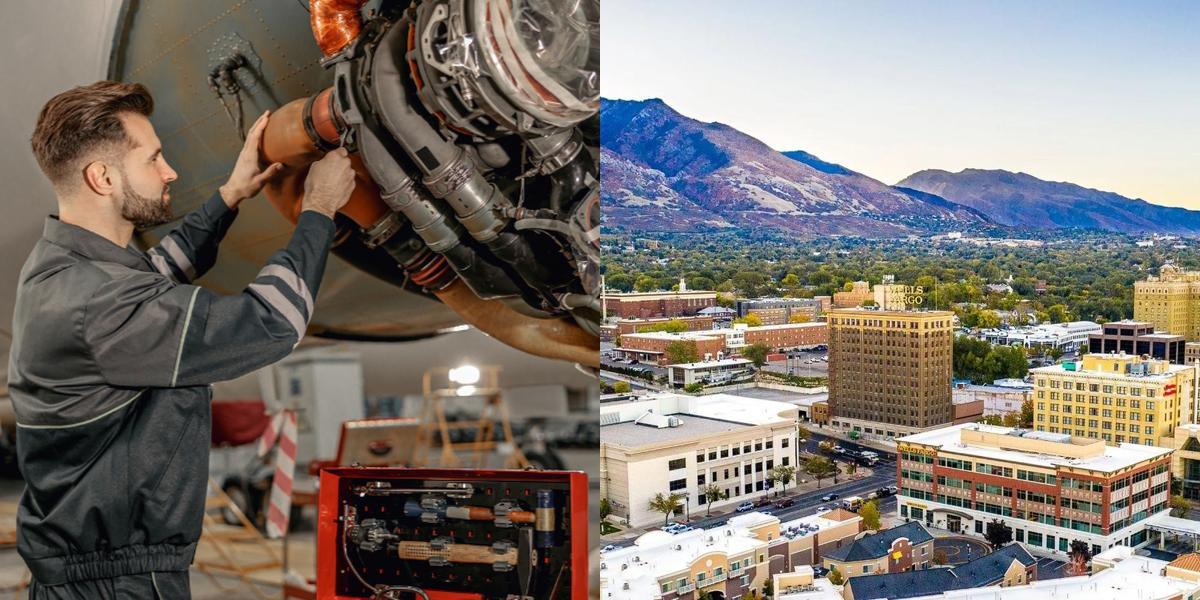How to Become an Aviation Mechanic in Utah

Want personalized recommendations?
Let's match you to the right program

If you have a passion for aviation and enjoy working with your hands, becoming an aviation mechanic in Utah may be the perfect career path for you. Aviation mechanics, also known as aircraft mechanics or aircraft maintenance technicians, are responsible for ensuring the safety and functionality of aircrafts. In this blog post, we will discuss what aviation mechanics do, where they work, the requirements to become one in Utah, and where you can find aviation mechanic classes.
Article continues after recommendations
Recommended for you
What is an Aviation Mechanic?
Aviation mechanics play a vital role in the aviation industry by inspecting, maintaining, and repairing aircrafts. Their responsibilities include:
- Conducting regular inspections and checks to identify any mechanical issues or malfunctions.
- Performing maintenance tasks, such as replacing parts, repairing engines, and fixing electrical systems.
- Following maintenance manuals and using specialized tools and equipment to complete repairs.
- Testing aircraft systems to ensure they are functioning properly and meeting safety standards.
- Documenting all maintenance and repair work for record-keeping purposes.
The work of an aviation mechanic requires attention to detail, technical skills, and a thorough understanding of aircraft systems and components.
Where Does an Aviation Mechanic Work?
Aviation mechanics can work in various settings, including:
- Airports: Many aviation mechanics are employed by airlines, maintenance repair organizations (MROs), or aircraft manufacturers, working at airport hangars or maintenance facilities.
- Military bases: Some aviation mechanics work for the military, maintaining and repairing military aircraft.
- General aviation facilities: Aviation mechanics can also work at smaller airports or private aviation companies, servicing private planes and helicopters.
The work environment can vary from indoor hangars to outdoor tarmacs, and mechanics may need to work in tight spaces or at heights.
How to Become an Aviation Mechanic in Utah?
To become an aviation mechanic in Utah, one must first complete an approved aviation maintenance technician program, which provides the necessary education and training. Next, the individual must obtain the required Federal Aviation Administration (FAA) certification, ensuring they meet the industry's standards. Once certified, they can then search for job opportunities in the aviation industry, earning a competitive salary commensurate with their skills and experience.
Requirements to Become an Aviation Mechanic in Utah
To become an aviation mechanic in Utah, you must meet certain education and legal requirements. These include:
- Education: You need to complete a Federal Aviation Administration (FAA)-approved aviation maintenance technician program. These programs are offered by vocational schools, community colleges, and technical institutes. The program typically takes 18 to 24 months to complete and covers topics such as aircraft systems, maintenance practices, and safety procedures.
- Legal requirements: After completing the program, you need to pass the FAA Airframe and Powerplant (A&P) certification exams. These exams test your knowledge and practical skills in aircraft maintenance. Once you pass the exams, you can apply for your A&P certificate, which is required to work as an aviation mechanic.
Exploring a Career in Aviation Mechanic Outside Utah
For anyone looking to become an Aviation Mechanic but is in a different state, your opportunity to work as an Aviation Mechanic might be found in Georgia, Kentucky, Montana, Oklahoma, or Wyoming. Should these not be viable options, Dreambound eases the process of discovering and comparing Aviation Mechanic classes with a search by zip code. With the drive to succeed and the support of resources like Dreambound, anyone can forge a successful path in trade, construction, and industry, no matter where they are.
Get courses selected just for you
Try our powerful search engine
Article continues after recommendations
More recommendations for you
How do I get my Aviation Mechanic certification?
Becoming an aviation mechanic is an excellent career choice for those who have a passion for aircraft and a desire to work in a hands-on, technical field. However, before you can start working as an aviation mechanic, you will need to obtain the necessary certifications.
In the United States, the Federal Aviation Administration (FAA) is responsible for certifying aviation mechanics. To become certified, you will need to meet the FAA's requirements and pass a series of exams.
The first step in obtaining your aviation mechanic certification is to complete a program of study at an FAA-approved Aviation Maintenance Technician School (AMTS). These schools offer a range of programs, including both a general airframe and powerplant (A&P) program and specialized programs for specific types of aircraft, such as helicopters or jets.
During your program of study, you will learn the skills and knowledge necessary to perform maintenance, inspections, and repairs on aircraft. You will also gain hands-on experience working with various types of aircraft and aircraft systems.
Once you have completed your program of study, you will need to pass a series of exams to obtain your FAA certification. These exams include a written test, an oral test, and a practical test. The written test covers a wide range of topics, including aircraft systems, regulations, and maintenance procedures. The oral and practical tests are designed to assess your ability to apply your knowledge and skills in real-world situations.
After passing your exams, you will need to apply for your FAA certification. This process involves submitting an application, along with the necessary documentation, to the FAA. Once your application has been reviewed and approved, you will receive your aviation mechanic certification.
How do I get a job as an Aviation Mechanic?
Once you have obtained your aviation mechanic certification, you will be ready to start looking for a job in the industry. The aviation industry offers a wide range of job opportunities for skilled mechanics, including positions at airports, aircraft manufacturers, and maintenance and repair facilities.
To increase your chances of finding a job as an aviation mechanic, it is important to network and make connections in the industry. Attend industry events, join professional organizations, and reach out to professionals already working in the field. These connections can help you learn about job openings and may even lead to job opportunities.
In addition to networking, it is also important to create a strong resume and cover letter that highlights your skills and experience. Be sure to include your aviation mechanic certification, as well as any relevant work experience or internships you have completed.
When applying for jobs, consider the type of aircraft or industry sector you are interested in working in. For example, if you have a passion for helicopters, you may want to focus your job search on companies that specialize in helicopter maintenance and repair.
Finally, be prepared for the job interview process. Research the company you are interviewing with and be prepared to discuss your skills and experience. Consider preparing a portfolio of your work, including any projects or repairs you have completed, to showcase your abilities.
Career Paths and Opportunities after Becoming an Aviation Mechanic
Once you have become an aviation mechanic, there are a variety of career paths and opportunities available to you. Some aviation mechanics choose to specialize in a particular area, such as avionics or powerplant maintenance, while others prefer to work on a wide range of aircraft and systems.
One possible career path for aviation mechanics is to work for an airline or aircraft manufacturer. These companies often have their own maintenance and repair facilities, where mechanics are responsible for keeping the company's aircraft in top working condition. Working for an airline or manufacturer can offer job stability and the opportunity to work on a variety of aircraft types.
Another career path for aviation mechanics is to work for a maintenance and repair facility. These facilities provide maintenance, repair, and overhaul services for aircraft owned by airlines, private companies, and individuals. Working for a maintenance and repair facility can offer the opportunity to work on a wide range of aircraft and gain experience with different systems and technologies.
Some aviation mechanics choose to start their own business and work as independent contractors. This can offer the flexibility to choose the types of projects you work on and the ability to set your own schedule. However, running your own business also comes with the responsibility of finding clients and managing the financial aspects of the business.
Finally, some aviation mechanics choose to further their education and become aviation maintenance managers or instructors. These positions often require additional training and experience, but can offer the opportunity to work in a leadership role or share your knowledge and experience with others.
Final Thoughts
Becoming an aviation mechanic is a rewarding career choice for those with a passion for aircraft and a desire to work in a hands-on, technical field. By completing an FAA-approved program of study and obtaining your aviation mechanic certification, you will be well-prepared to start your career in the industry.
Whether you choose to work for an airline, a maintenance and repair facility, or start your own business, there are a variety of career paths and opportunities available to aviation mechanics. By networking, creating a strong resume, and staying up-to-date on industry trends, you can increase your chances of finding a job and advancing in your career.
So, if you have a love for aircraft and a desire to work with your hands, consider pursuing a career as an aviation mechanic. With the right training and certification, you can turn your passion into a fulfilling and successful career.
If this article isn't quite hitting the mark for you, why not give these other articles a try:

Harold Roldan is a Growth team member at Dreambound. With a background in IT, he works with data and automation to improve team efficiency and workflows. He spends his free time playing musical instruments or studying data, computers, and technology.



